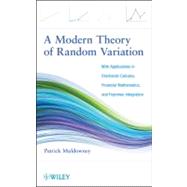A Modern Theory of Random Variation With Applications in Stochastic Calculus, Financial Mathematics, and Feynman Integration
, by Muldowney, Patrick- ISBN: 9781118166406 | 111816640X
- Cover: Hardcover
- Copyright: 10/30/2012
This book presents a self-contained study of the Riemann approach to the theory of random variation and assumes only some familiarity with probability or statistical analysis, basic Riemann integration, and mathematical proofs. The author focuses on non-absolute convergence in conjunction with random variation. Any conception or understanding of the random variation phenomenon hinges on the notions of probability and its mathematical representation in the form of probability distribution functions. The central and recurring theme throughout this book is that, provided the use a non-absolute method of summation, every finitely additive, function of disjoint intervals is integrable. In contrast, more traditional methods in probability theory exclude significant classes of such functions whose integrability cannot be established whenever only absolute convergence is considered. An examples includes the Feynman "measure-which-is-not-a-measure" - the so-called probability amplitudes used in the Feynman path integrals of quantum mechanics. This book presents a framework in which the Feynman path integrals are actual integrals, and they are utilized to express Feynman diagrams as convergent series of integrals. Important classes of stochastic processes, including Brownian motion, are defined by the properties of the increments of the process at successive instants of time. Since the presented method of summation (or integration) is non-absolute, the stochastic calculus of Brownian motion is significantly simplified. The author's study of random variation also includes the definition that the measurability of the variables is a consequence and not a pre-condition of the definition. Also, in place of probability measure functions, the more fundamental role is taken by distribution functions, defined not on measurable sets, but on intervals. These amendments to the classical foundation of probability theory allow for the Feynman theory of the path integral of quantum mechanics to be within the scope of the theory of random variation as well as aids in the simplification of the theory of stochastic calculus.






